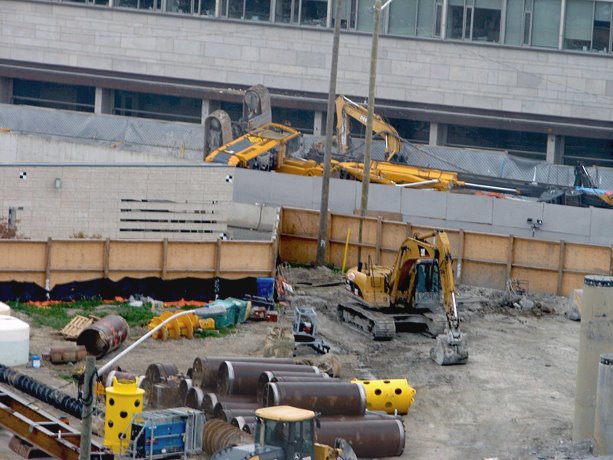Ontario’s Ministry of Labour is implementing aggressive new safety and training regulations for drill rig operators in hopes of ensuring a tragic accident like the one that killed a promising young construction worker four years ago never happens again.
The death of 24-year-old crane apprentice Kyle Knox from injuries suffered on a subway construction site at York University in Toronto on Oct. 11, 2011 drove Mike Gallagher, business manager of Local 793 of the International Union of Operating Engineers, to fight for better regulation to ensure safer operation of drill rigs, culminating in the Dec. 9 announcement he called a "good day" but also "cold comfort."
Knox, an employee of Anchor Shoring & Caissons Ltd. who was operating a backhoe at the time of the incident, was crushed when a junior operator who was boring holes for Advanced Construction Techniques Ltd., using a crane-like rotary drill rig with an auger attached to a boom, swung the drill rig around on unstable soil and it toppled over. Knox was pronounced dead at the scene and five others were injured including an excavator who became permanently disabled.
Appearing at a work site on Eglinton Avenue in Toronto with a large drill rig as a backdrop, Minister of Labour Kevin Flynn announced new drill rig requirements under the Occupational Health and Safety Act (OHSA) that will introduce technical and operational safety measures and mandatory drill rig operator training and certification. The regulations will take effect July 1, 2016.
Gallagher says that in future, drill rig operators will be required to undergo extensive training and two six-week classroom sessions, with those operating larger drill rigs — with a capacity of over 270 kilonewton metres of torque — needing 6,000 hours of training.
"Nobody in Ontario after next July will be able to operate this equipment without taking a full apprenticeship to become a mobile crane operator," said Gallagher. "It’s a very good day for the industry.
"Rotary foundation drill rig operators on project sites will now have to provide written proof of training when requested to do so by a Ministry of Labour inspector."
Flynn said in an interview, "You just see the power and the force that these things have, you shouldn’t have someone just jumping in a cab and figuring this out as they go along."
Contractor OHL-FCC GP Canada was fined $400,000 on Nov. 28, 2014 after pleading guilty to failing as a constructor to ensure that the required OHSA safety measures were followed.
An investigation determined that major factors in the tipping of the drill rig were inadequate site preparation, a soil base unable to withstand the weight of the drill rig and terrain with a slope greater than recognized safety parameters.
Gallagher says the drill rig operator working on the York University site was brought in from outside Ontario and had minimal experience. A journeyman who had been working with him was not on site that day.
"The operator who was left had about 80 hours experience operating a rotary drill," said Gallagher. "In our view, he should not have been alone on the drill. We would more than likely have considered him to be on the level of an apprentice. We would have made sure there was a licensed operator with him while he was at the controls."
The announcement by Flynn comes three years after a promise by then Minister of Training, Colleges and Universities Glen Murray that Ontario would introduce mandatory training for drill rig operators. Explaining the three-year delay, Flynn mentioned the persistence of Gallagher, whose union office is in Flynn’s home riding of Oakville, in pushing the initiative after he encountered "a feeling within the ministry that there was enough regulation in place to prevent these types of accidents.
"Mike was adamant that there wasn’t and I bought into what Mike was saying. The guys who work these machines on a daily basis were clear, we need some regulation."
Flynn was appointed minister of labour in June 2014 and he instructed that the regulatory process be jumpstarted.
"It is a bittersweet celebration," said Gallagher, "Yes I am happy we have closed this gap and we will protect people in the future, but I will be honest with you, it is cold comfort to the family of Kyle Knox and his mother Sherry, and you know what, it is cold comfort to me as well. He was a brilliant young man who didn’t need to die. He was a week away from his apprenticeship, he was engaged to be married, he had his whole life ahead of him, and if proper steps had been taken the tragedy could have been avoided."
The Operating Engineers have committed to buying a rotary drill valued at close to $2 million that will be installed at either their Morrisburg or Oakville training campuses. Both Flynn and Gallagher say the seven-month grace period before the certification requirements take effect is adequate notice for workers and the industry, with industry on side and the Operating Engineers all set to implement the training program.
"It is a perfect example of industry, government and labour working together," said Flynn. "The industry is behind this, they weren’t fighting Mike at all, they know it is their reputation on the line, it is their employees that are on the line, and they know the pieces of equipment better than anybody."
Gallagher lamented that it takes a tragedy to bring about change, as opposed to a process where dangerous trades could be flagged.
"It is my view that we can easily identify (hazards) using normal criteria in terms of complexity of the operation of the equipment and to take steps. Maybe if there was an expedited process of some kind. I think it’s terrible how we keep on cleaning up the mess after the fact, it is not right."







Recent Comments
comments for this post are closed